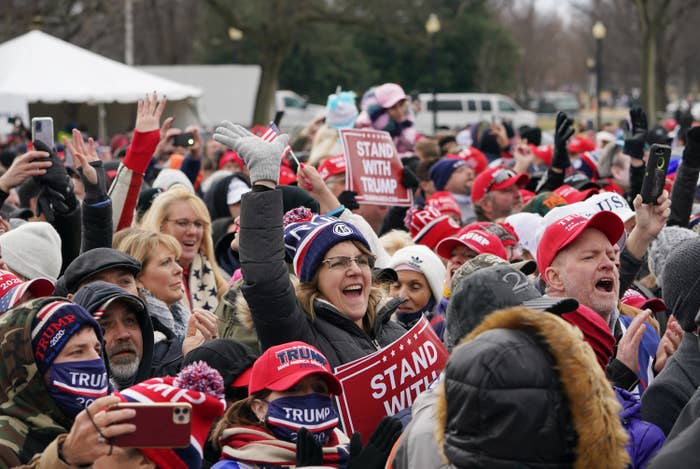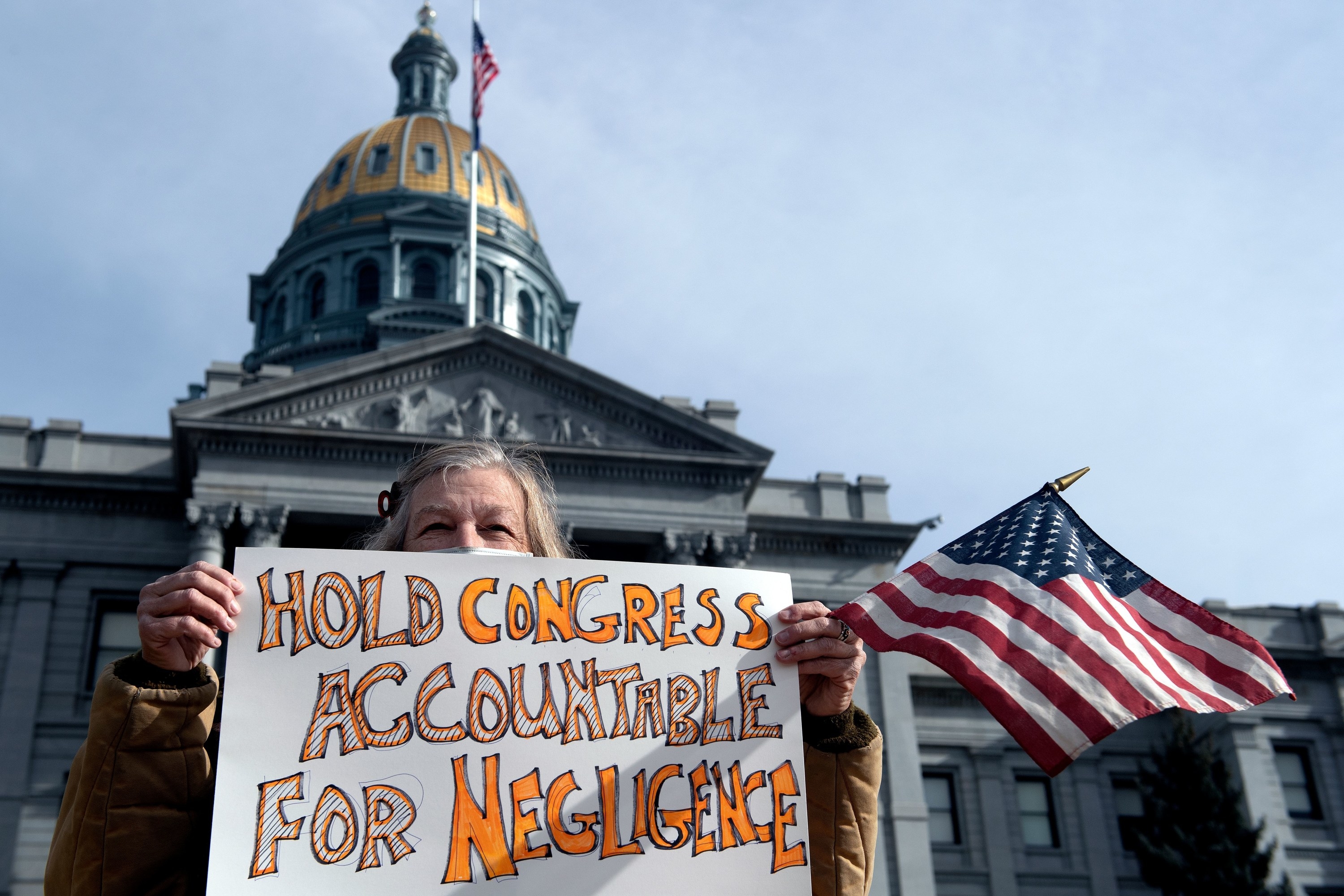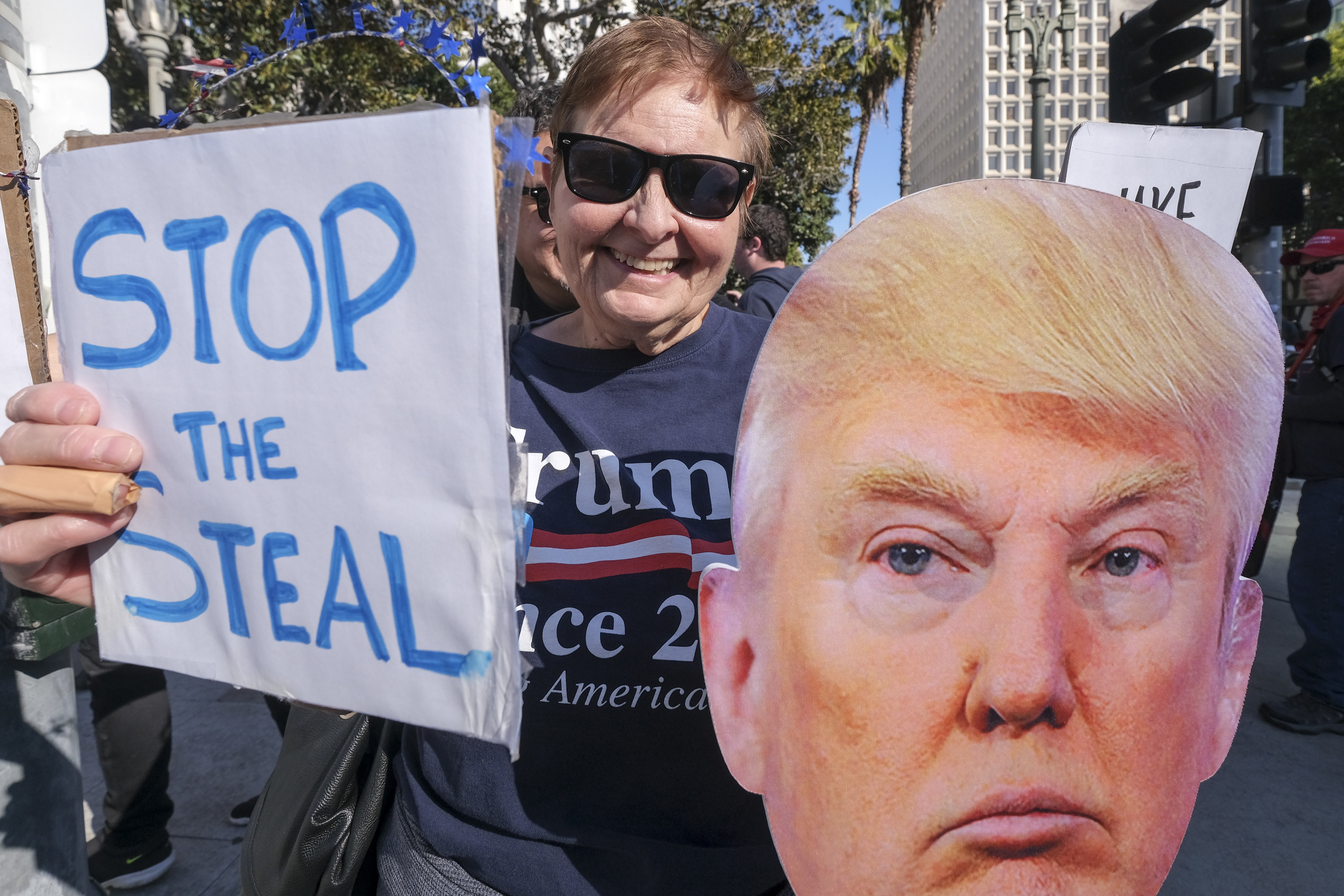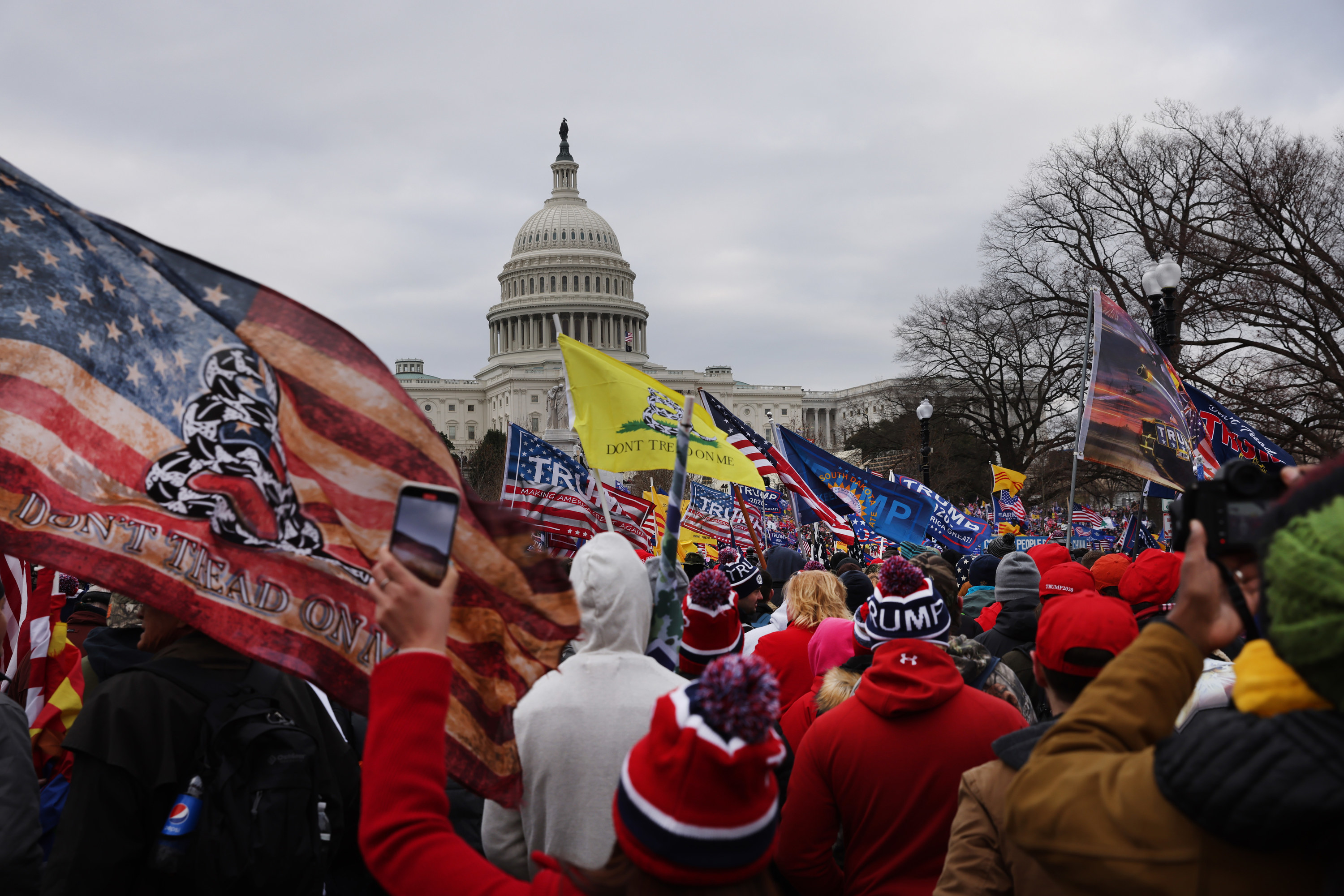
In December, I wrote that Trump supporters I spoke to were increasingly “comfortable with the idea of a bloody uprising against their fellow citizens.” Whipped up by President Trump’s ceaseless torrent of lies about the election, Trump fans — not hardened militia members, but otherwise unremarkable and law-abiding private citizens — were talking about the potential for civil war and insurrection, convinced they were the victims of a seditious conspiracy to put Joe Biden in the White House.
If I could go back and rewrite that piece, I would take out the word “idea.” The mob that stormed the Capitol on Jan. 6 was no mere idea. The Dec. 12 rally I attended degenerated into violence at night, with packs of Proud Boys instigating fights on the streets of DC, but the daytime crowd, despite what some of them told me, didn’t seem likely to walk the walk anytime soon. From years of covering white nationalists and the alt-right, I already knew that the right contained violent and anti-democratic elements. What Jan. 6 showed was how deeply even the nice church ladies and retired grandpas who have nothing to do with those groups have descended into an alternate universe. Information coming out about the rioters has shown that they came from a cross-section of Trump’s base, some from identifiable groups like the America First “groypers” or the Proud Boys, but many people who aren’t involved in any militias or splinter groups, just regular folks with regular jobs from all over the country. It is these people whom Trump’s election conspiracy-mongering radicalized to the point of participation in an anti-democratic putsch.
Anyone can conclude this from the available facts, but the period following the Capitol attack has shown that most of the people in question will not admit it. Conspiracy theories about a stolen election brought the Trump movement to insurrection, and a further set of conspiracy theories will insulate it from reckoning with the consequences. The truth is that many Trump supporters immediately concluded that their side simply did not commit the violence, and that the incident was engineered to discredit them and Trump. Trump may be on his way out, but he leaves behind him a movement that appears to have made a decisive break with reality.

Over the last week, I caught up with some Trump supporters I met at the Dec. 12 rally or at previous Trump rallies during the campaign to see what they thought of the Capitol riot and of Biden’s upcoming inauguration.
Brad Lynnet, a 64-year-old retiree, organized buses to the Jan. 6 rally in DC from Cleveland. I first met him in December in DC, where he carried a “wake the fuck up” sign to the demonstrations and warned of “treason.” Lynnet became “interested in who controls the world” growing up in the 1970s, and researched the Bilderberg group and the Council on Foreign Relations, targets of “New World Order” conspiracies for decades. He supported Ross Perot’s presidential campaigns in the 1990s, but he hadn’t met his true political match until Donald Trump, “and I just fell in love with everything that man stood for.” To Lynnet, Trump’s presidency was a “fantastic” success, but “hidden from view” by the media. I asked Lynnet to list what he viewed as Trump’s biggest accomplishments in office. He hesitated. “Fighting, jeez, child abuse. Human trafficking. Getting rid of the adrenochrome junkies. Fighting abortion.” Lynnet said he didn’t follow QAnon per se, but did pay attention to the pronouncements of “Q” — only as a jumping-off point for his own research. “I don't trust anybody on anything until I verify it myself,” he said.
Lynnet organized seven buses full of “372 patriots,” he said, to travel to and from the rally on Jan. 6. Lynnet said he didn’t enter the Capitol and said he didn’t know anyone who did, though he did come within 400-500 feet of the steps on the east side of the building in order to take pictures, where he says he inhaled tear gas as the police and rioters clashed.
Though Lynnet saw the break-in occur, he doesn’t believe Trump supporters did it. “I know it wasn't Trump supporters,” he said, a view shared by some Republicans in Congress as well as repeated by a number of conservative media figures. He believes the invasion was a “staged false flag to make us look bad.” Some genuine supporters may have “gotten caught up in the rush,” Lynnet said, but he thinks that was all part of the agitators’ plan. Trump didn’t incite anyone, he said; he just said to “go there and tell them what you think, which is what we did...It was fun. I gotta admit, it was fun to participate in the election process. That’s what we went there to do, was participate.”

Roxana Lawson, 66, attended the big “stop the steal” rallies in Washington in November and December but couldn’t make it on Jan. 6; her grandchildren were visiting her in Florida.
But she feels just as certain as Lynnet that the invasion was the work of provocateurs; in her words, “a set-up so they can use it to pull the impeachment BS.”
“I think they were antifa and Black Lives Matter members dressed as Trump supporters, the ones that created the chaos,” she said.
Around 10 buses left from her area, she said.
“None of the ladies are violent; they’re ladies, they’re homemakers, they didn’t go there to pick a fight or be violent against anybody,” she said. Lawson said her friends who attended the rally agreed with her that the break-in was a “charade by the liberals.”
I met Ioana Childers, 58, at a Trump campaign rally in Hickory, North Carolina, on Nov. 1 in the final days before the election. An immigrant from Romania, Childers lived under Nicolae Ceausescu’s Communist regime and retains a deep loathing of socialism, which she believes a Biden administration would usher into America. At the rally in November, she (and nearly everyone else I spoke to) was certain Trump would win “in a landslide,” and that the polls projecting his loss were “fake.” If Biden were to win, she said, the country would be “done.”
Over Facebook Messenger last week, Childers insisted that “not a single Trump supporter” had entered the Capitol, and that the culprits were antifa members paid to infiltrate the crowd. “Did you not see that all was planned?” she said.
I had asked her how she felt about Biden’s upcoming inauguration, but she rejected the premise of the question.
“What inauguration you talk about?” Childers wrote. “Biden will never be inaugurated.” She told me Biden hadn’t won, and to open my eyes and “be part of the truth.”

Trump’s term is nearly over. Facing a new impeachment, Trump admitted this in a video released by the White House the day after the attack on the Capitol. “A new administration will be inaugurated on Jan. 20," Trump said. "My focus now turns to ensuring a smooth, orderly, and seamless transition of power."
Even this, the closest to a full concession that Trump will likely ever come, is not enough to extinguish the last flames of hope. Lawson pointed out to me that Trump merely spoke of a “new” administration, not the Biden administration. The second Trump administration will be “totally, totally clean,” Lawson said. “Pence is going to the garbage and I wouldn’t be surprised if [former national security adviser Mike] Flynn becomes the new vice president.”
Lawson insisted Biden would not be sworn in. “I don't have to worry because I don't think that's gonna happen,” she said. “That hasn't crossed my mind.” Lawson said she had placed multiple bets on Trump staying for another term, amounting to about $2,000.
Lynnet took a relatively more measured stance, saying that it wouldn’t surprise him if something happened to prevent Biden’s being sworn in. “I know Trump was a brilliant man. He knows exactly how it was going to play out from the beginning. And I believe he's ready to do something.”
It’s difficult to say how many Trump supporters still, at this late stage, after every one of the president’s attempts to stay in office have failed, believe he will succeed. But the fact that any of them do speaks to the enduring power of the mythology Trump helped create. The reality of Biden becoming president on Wednesday is too difficult to square away, so it is simply not being squared. Instead, some are falling deeper into delusion, expanding a divide on the right that New York Times columnist Ross Douthat called “not a normal ideological division or an argument about strategy or tactics, but a split between reality and fantasy that may be uniquely hard for either self-interest or statesmanship to bridge.”
Focus has turned to retribution for the Republicans whom Trump supporters believe were insufficiently helpful to Trump’s efforts to remain in office, and though this is not the first time right-wing base voters have targeted Washington Republicans, this iteration has taken on a freshly menacing character. Republicans have feared their base for years — but in a political sense. The innovation of the Stop the Steal era is that the threat of physical violence is now part of the equation, finding its fullest expression so far in the Capitol invasion, but not its only one. Some of the Capitol rioters called for Vice President Mike Pence to be hanged after Pence refused Trump’s demands that he stop the electoral vote certification in the Senate. After Sen. Lindsey Graham, one of Trump’s most obsequious Senate allies, acknowledged Biden as the legitimate winner of the election on the night of the insurrection and hinted at a break with Trump (“enough is enough”), he was accosted by angry Trump supporters later that week at Reagan National Airport. Less than a week later, Graham was aboard Air Force One with Trump, accompanying him on a trip to Texas.
Rep. Peter Meijer, one of 10 House Republicans who voted to impeach Trump last week for inciting the Capitol mob, told MSNBC last week that he and other lawmakers were buying body armor and taking other precautions to protect themselves from violent retribution. “It’s sad that we have to get to that point, but you know, our expectation is that someone may try to kill us,” he said.

And the risk of political ramifications is present too. Many House Republicans want to oust Rep. Liz Cheney from her leadership position after she voted to impeach Trump, and Trump allies are calling for a primary of Brian Kemp, the Georgia governor, who didn’t kowtow to Trump’s election fraud demands. Rep. Tom Rice, a conservative Republican from South Carolina whose vote to impeach Trump last week came as a surprise, has faced a strong backlash in his home district, and challengers to his 2022 run are already emerging. Rice’s Facebook page is full of comments from angry constituents fuming over his vote. “Tom Rice, you have committed political suicide,” reads one comment left Saturday. “Start packing your bags and looking for a real job. DRAIN THE SWAMP.”
A more existential threat to the GOP could come from the Trump voters who say they’ll leave the party entirely.
“Payback time is gonna come real soon,” Lawson said, when Trump defeats “all the corruption that prevails in Washington. Everybody committed treason that works there, Republicans and Democrats alike.”
She said she is “seriously considering abandoning the Republican Party.”
Like Lawson, Lynnet is disgusted with the GOP and wants to join a new party, which he thinks will grow to overshadow both major parties. Lynnet and some friends of his came up with a new term to replace the “RINO” (Republican In Name Only) sobriquet popularized during the tea party wave a decade ago. “We’re calling all of Congress ‘AINOs,’” he said. “Americans In Name Only.”
On the way back to Ohio from Washington this month, Lynnet’s bus caravan stopped in Breezewood, Pennsylvania, a commonly used rest stop between two major highways. Other returning buses full of Trump supporters had the same idea; Lynnet estimated 50 buses, and 100 people in line at the convenience store.
The returning rallygoers were disappointed and exhausted, he said. “We all assumed it was a false flag.”
